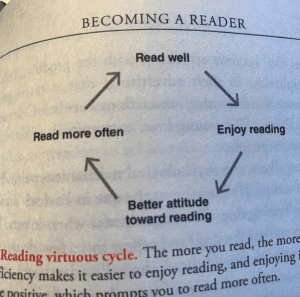Can I tell you about Avi a hypothetical, average American 8 year-old child? Avi will be our guide to understanding some important experiences of the average American child….
First, Avi—like all American 8 year-olds at the statistical average—spends about 2 and a half hours a day with some form of screen media, such as YouTube and Netflix. That means he spends nearly one fifth of his waking hours with a digital device, even including school days (see this report).
Of these 2.5 hours of screen time, 48 minutes are spent on mobile—up from a total of just 5 minutes a day on mobile devices in 2011.
Despite the American Academy of Pediatricians recommendations for parents to limit media use to ensure that other developmental needs are met, Avi’s parents have not been made aware of these guidelines.
At home, he may be read aloud at times, but only 30% of U.S. parents read aloud daily or weekly to their 6-8 year-olds. However, in the next few years, this time with a parent and a book will plummet to nearly zero.
Additionally, in the school setting, Avi spends just a little over 1 minute per day reading himself (see studies 1 or 2). Given that, it’s not surprising that he is not achieving grade level results in reading achievement.
His 3rd grade teacher, sometimes reads aloud to him, but not as much as literacy experts would likely recommend. From one study, one might infer that he’s read aloud to less than 5 minutes a day.
So when Avi has free time at school or at home, guess what he chooses to do?
Not read.
He’s likely choosing a digital device…or anything but reading.
As a result of these daily patterns of behavior and opportunities (or lack thereof), Avi will continue down a path of low reading achievement; low reading engagement; and lower school achievement. He even can expect reduced outcomes as an adult, in areas such as earned income, community involvement, and even health outcomes.
Does Avi seem familiar to you? Does he resemble your mentee?
Do you desire for your mentee to have better experiences and better outcomes than Avi?
Reading Aloud to Prep the Love of Reading
If so, please consider the power of the read aloud to transform Avi’s future reading and general life outcomes. In recent posts, I’ve shared how powerful the read aloud can be to boost general achievement, as well as the relationship you two enjoy. But in this post, I’d like to point to the power of the read aloud to create a love of reading.
In a world of mindless, easy entertainment at the push of a button, the sustained attention needed to read or even to listen to a book being read aloud takes mental effort—and more effort for the younger child or for any person with limited exposure to books.
In our new culture of digital mental dis-engagement, learning to enjoy reading is becoming more effortful than it may have felt for past generations. Even learning to enjoy a read aloud takes exposure, experience, practice.
Yet, reading independently or being read to are practices that are dwindling. When you read aloud to your mentee, however, you have the opportunity to offer more delightful reading exposure and practice to her. Reading aloud to her increases the chances that she’ll develop enough of a mental reading “muscle” to realize that reading actually is fun and entertaining.
Consider each read aloud opportunity with your mentee as part of the dam being built up against the tidal wave of digital mental dis-engagement that she otherwise experiences each day.
Reading Initiates a Virtuous Cycle
As your mentee builds up the mental stamina to engage with your read alouds, she’s more likely to enjoy reading more and more. With increased enjoyment in reading, comes a better attitude toward reading:
“Oh, I loved that story!”
“I can’t wait to hear what happens next!”
“I wonder what other books this author has written.”
Like all skills, when we enjoy them, we develop a better attitude about them. As a result, we engage in the skill more frequently. And with increased engagement or practice, achievement grows.
And so it is with reading! As Dr. Dan Willingham writes in his book, The Reading Mind (see image below):

The more you read, the better your achievement. As a result, the more you enjoy reading and the better your attitude about reading becomes.
Consider how your reading aloud to your mentee may transform her perceptions about reading. She may begin to enjoy reading more. She may even read more often on her own, as a result.
When she reads more…she’ll get better at it….and she’ll likely move forward in a positive cycle causing greater and greater love of reading.
While Average Avi may be suffering from woefully too few opportunities to be read to and to read himself, when you institute a routine practice of reading aloud to your mentee, you are more likely to change her reading future by…..
Coaching her to have the mental stamina to attend to a read aloud.
Nurturing her enjoyment of reading.
Inspiring a better attitude about reading.
Witnessing her reading more and more…on her own.
Launching her into the next stage with better reading and school achievement!
Techniques for the Resistant Listener

Even though being read to is often considered a privilege and entertaining, there are some who have yet to learn how wonderful the experience can be. If you find that to be the case with your mentee, try these techniques to help bridge them from resistance to delight:
- Discover your mentee’s interests and find books, magazines, or internet sites in her interest area. If she doesn’t have favorite books yet, perhaps she has favorite movies or TV that can help your detective work.
- Keep the read aloud time initially brief and slowly increase the child’s “stamina” for longer listening periods, week by week.
- Offer paper and pencils or crayons for drawing during the reading. Or use other tactile “fidgets,” such as playdough.
- Allow student to stand or move around as you read.
- Try joke or riddle books where interaction is built in.
- Select beautiful picture books that help explain the text through illustrations.
- Graphic novels or manga can help give life to the story that the child may not yet picture in her mind.
- Interactive websites, such as Wonderopolis, are other ways of scaffolding the listening demands with visual support, including videos.
- Find a special cozy or limited access spot for reading aloud, such as a library couch or an outdoor picnic bench.
- Try reading aloud for 15 minutes at the end of your mentor hour after you’ve already exhausted your mentee by playing outside. 😉
May you find the effort to read aloud to be fulfilling!
